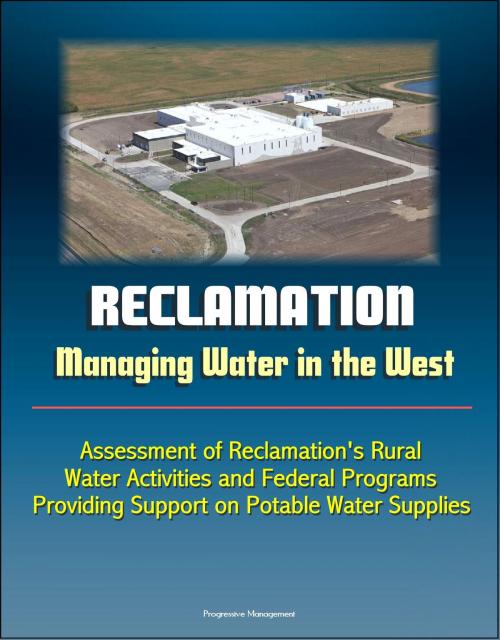Reclamation: Managing Water in the West - Assessment of Reclamation's Rural Water Activities and Federal Programs Providing Support on Potable Water Supplies
Nonfiction, Science & Nature, Technology, Engineering, Environmental| Author: | Progressive Management | ISBN: | 9781311948229 |
| Publisher: | Progressive Management | Publication: | February 20, 2015 |
| Imprint: | Smashwords Edition | Language: | English |
| Author: | Progressive Management |
| ISBN: | 9781311948229 |
| Publisher: | Progressive Management |
| Publication: | February 20, 2015 |
| Imprint: | Smashwords Edition |
| Language: | English |
Reclamation has, over its more than 100 years in existence, designed and constructed some of the largest and most important water supply projects in the western United States including Hoover Dam, Grand Coulee Dam, and the Central Valley Project. Because of that expertise, rural communities have often sought Reclamation's assistance in addressing their need for potable water supplies. Prior to 1980, Reclamation's participation was generally limited to providing technical assistance in the scoping and development of water projects intended to solely provide potable water supplies for rural communities. However, Congress specifically authorized Reclamation's involvement in certain projects to deliver potable water supplies to rural communities -- generally not in the initial project scoping, but in the implementation and construction of a project. Since about 1980, Congress has specifically authorized Reclamation to undertake the design and construction of specific projects intended to deliver potable water supplies to specific rural communities located in the 17 western States - primarily in North Dakota, South Dakota, Montana and New Mexico. In addition, Congress specifically authorized Reclamation's involvement in the Lewis and Clark Rural Water Supply Project located in the Reclamation State of South Dakota, but also in the non-Reclamation states of Iowa and Minnesota. In some cases, the projects authorized did not go through the level of analysis and review that is consistent with Reclamation's other projects and did not meet the economic, environmental and design standards that are required to determine the feasibility of other Federal water resources development projects. As a result, with the specific authority to design and construct a project in place, Reclamation was required to both complete the analysis that was necessary, and adhere to the project configuration and designs that were specified by the authorizing statutes. Because Reclamation did not have a rural water program at that time, its efforts lacked a coordinated approach. Furthermore, while Reclamation carried out the projects and activities that were specifically authorized in an effective manner, concerns existed that it lacked the controls necessary to ensure that projects that are developed for its involvement were cost effective and represented a thorough examination of the options that could efficiently address the water supply needs in a cost effective manner. In 2004, the Administration submitted a legislative proposal to establish a formal rural water supply program within the Bureau of Reclamation. In late 2006, Congress enacted, and the President signed, the Rural Water Supply Act of 2006 (Act), which became P.L. 109-451.
Reclamation has, over its more than 100 years in existence, designed and constructed some of the largest and most important water supply projects in the western United States including Hoover Dam, Grand Coulee Dam, and the Central Valley Project. Because of that expertise, rural communities have often sought Reclamation's assistance in addressing their need for potable water supplies. Prior to 1980, Reclamation's participation was generally limited to providing technical assistance in the scoping and development of water projects intended to solely provide potable water supplies for rural communities. However, Congress specifically authorized Reclamation's involvement in certain projects to deliver potable water supplies to rural communities -- generally not in the initial project scoping, but in the implementation and construction of a project. Since about 1980, Congress has specifically authorized Reclamation to undertake the design and construction of specific projects intended to deliver potable water supplies to specific rural communities located in the 17 western States - primarily in North Dakota, South Dakota, Montana and New Mexico. In addition, Congress specifically authorized Reclamation's involvement in the Lewis and Clark Rural Water Supply Project located in the Reclamation State of South Dakota, but also in the non-Reclamation states of Iowa and Minnesota. In some cases, the projects authorized did not go through the level of analysis and review that is consistent with Reclamation's other projects and did not meet the economic, environmental and design standards that are required to determine the feasibility of other Federal water resources development projects. As a result, with the specific authority to design and construct a project in place, Reclamation was required to both complete the analysis that was necessary, and adhere to the project configuration and designs that were specified by the authorizing statutes. Because Reclamation did not have a rural water program at that time, its efforts lacked a coordinated approach. Furthermore, while Reclamation carried out the projects and activities that were specifically authorized in an effective manner, concerns existed that it lacked the controls necessary to ensure that projects that are developed for its involvement were cost effective and represented a thorough examination of the options that could efficiently address the water supply needs in a cost effective manner. In 2004, the Administration submitted a legislative proposal to establish a formal rural water supply program within the Bureau of Reclamation. In late 2006, Congress enacted, and the President signed, the Rural Water Supply Act of 2006 (Act), which became P.L. 109-451.















